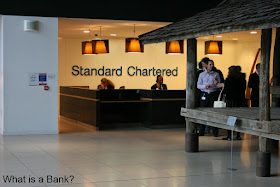What is a Bank ? Introduction, Definition and Features of Bank
 What is a Bank ? Introduction ↓
What is a Bank ? Introduction ↓
Finance is the life blood of trade, commerce and industry. Now-a-days, banking sector acts as the backbone of modern business. Development of any country mainly depends upon the banking system.
The term bank is either derived from old Italian word banca or from a French word banque both mean a Bench or money exchange table. In olden days, European money lenders or money changers used to display (show) coins of different countries in big heaps (quantity) on benches or tables for the purpose of lending or exchanging.
Image Credits © Tardiskey
A bank is a financial institution which deals with deposits and advances and other related services. It receives money from those who want to save in the form of deposits and it lends money to those who need it.
 Definition of a Bank ↓
Definition of a Bank ↓
Oxford Dictionary defines a bank as "an establishment for custody of money, which it pays out on customer's order."
 Characteristics / Features of a Bank ↓
Characteristics / Features of a Bank ↓
1. Dealing in Money
Bank is a financial institution which deals with other people's money i.e. money given by depositors.
2. Individual / Firm / Company
A bank may be a person, firm or a company. A banking company means a company which is in the business of banking.
3. Acceptance of Deposit
A bank accepts money from the people in the form of deposits which are usually repayable on demand or after the expiry of a fixed period. It gives safety to the deposits of its customers. It also acts as a custodian of funds of its customers.
4. Giving Advances
A bank lends out money in the form of loans to those who require it for different purposes.
5. Payment and Withdrawal
A bank provides easy payment and withdrawal facility to its customers in the form of cheques and drafts, It also brings bank money in circulation. This money is in the form of cheques, drafts, etc.
6. Agency and Utility Services
A bank provides various banking facilities to its customers. They include general utility services and agency services.
7. Profit and Service Orientation
A bank is a profit seeking institution having service oriented approach.
8. Ever increasing Functions
Banking is an evolutionary concept. There is continuous expansion and diversification as regards the functions, services and activities of a bank.
9. Connecting Link
A bank acts as a connecting link between borrowers and lenders of money. Banks collect money from those who have surplus money and give the same to those who are in need of money.
10. Banking Business
A bank's main activity should be to do business of banking which should not be subsidiary to any other business.
11. Name Identity
A bank should always add the word "bank" to its name to enable people to know that it is a bank and that it is dealing in money.

July 25, 2013 at 9:19 AM
is bank a company ? r partner ship? plz give me answer
July 26, 2013 at 4:28 AM
As per the statutory norms, bank is a company which has the business of lending and accepting the money from the public and others.
August 6, 2013 at 10:44 AM
how's the person....can be as a bank...??
according to 2nd characteristic???
August 7, 2013 at 12:49 AM
Mayuri, it is to be understood as follows:
1. Person means an individual running the banking business.
2. Firm means more then one person running the banking business.
3. Company means an organisation where the shareholders invest their money and management runs the banking business.
December 18, 2013 at 10:03 AM
A banking 'company' is granted a legal entity as per law(of most countries, but in India it's the Banking Companies Act. 1949), however it is not an individual and is represented by agents(also called the directors). One must understand that each law has its own definitions of a person, which may be an individual, firm, AOP, Co. or even the local authority. So technically, whether a bank is run by a single person(which is usually recognised as a financial institution as banks need to conform to central bank rules), a partnership firm or by an entire company, it is a 'person'.